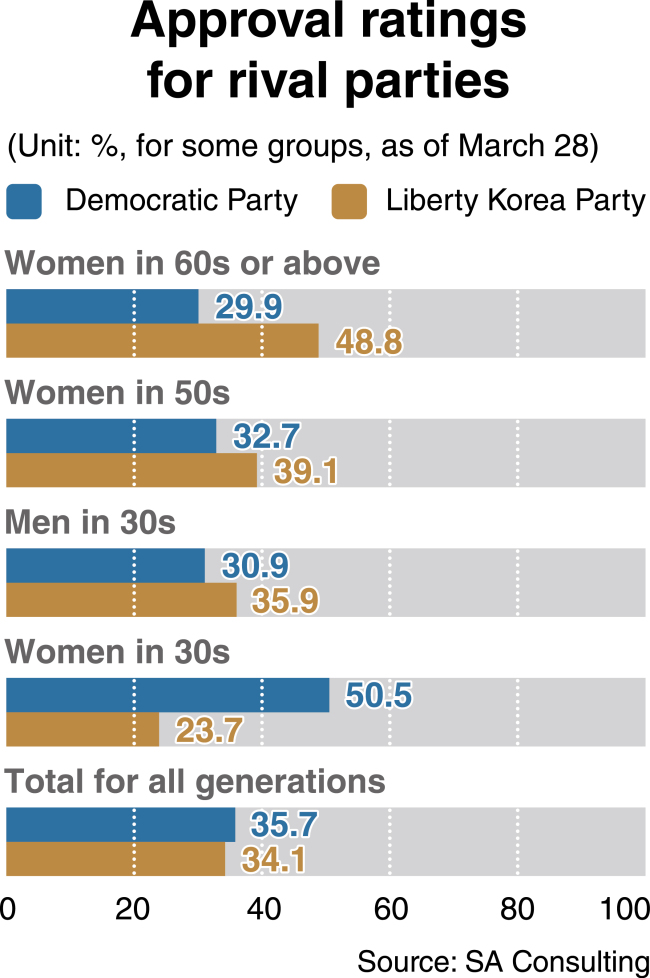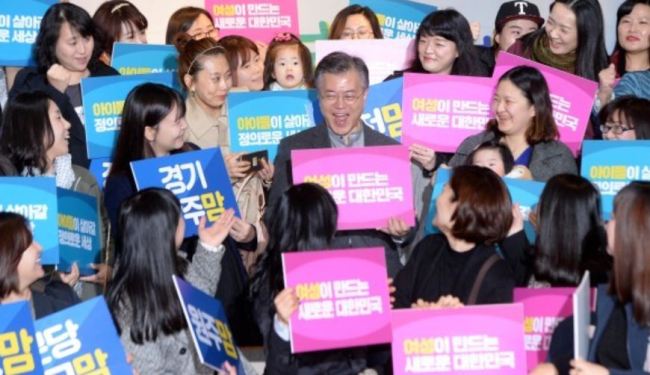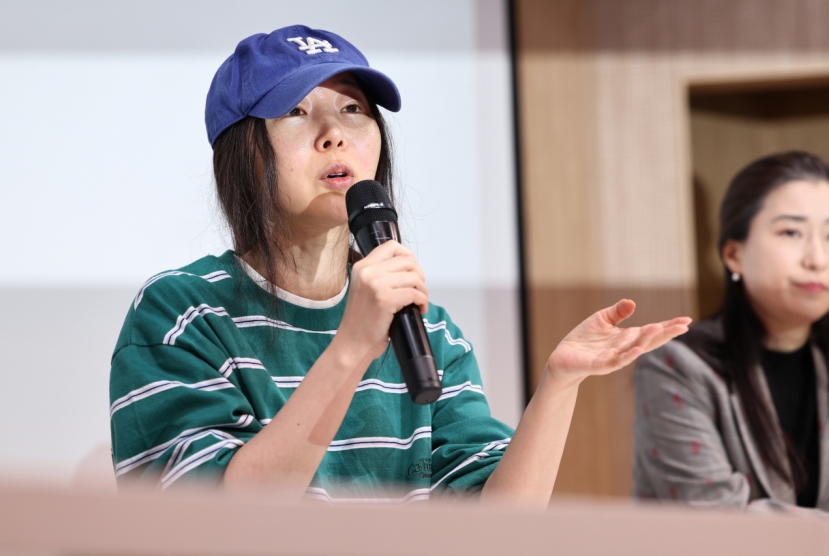[News Focus] Men in 30s withdrawing support for Moon, liberals: poll
By Kim Yon-sePublished : April 2, 2019 - 13:43
SEJONG -- Since the latter half of 2018, the support ratings for President Moon Jae-in among male South Koreans in their 20s have continued to drop sharply.
A large portion of young men have expressed their discontent toward the Moon government and the ruling Democratic Party of Korea in online communities. They are complaining about “adverse gender-discrimination” compared to the female youth or “disadvantages” in the job market.
When Moon was a candidate in February 2017, he said he would become a “feminist president” in a speech at a forum in Seoul.
A large portion of young men have expressed their discontent toward the Moon government and the ruling Democratic Party of Korea in online communities. They are complaining about “adverse gender-discrimination” compared to the female youth or “disadvantages” in the job market.
When Moon was a candidate in February 2017, he said he would become a “feminist president” in a speech at a forum in Seoul.

Over the past several months, the gap between Moon’s approval ratings among men and women in their 20s have remained quite wide -- by about 20 to 40 percentage points.
The trend is extraordinary given the history of Korean politics, as young men have always taken the initiative to vote en bloc and presidential candidates and politicians of liberal parties had positive ratings for decades.
Although previous polls showed that male citizens in their 30s and 40s were faithfully supporting Moon and the Democratic Party, symptoms of en masse breakaway of males in their 30s emerged recently for the first time in about two years since Moon took office in May 2017.
According to a survey conducted by SA Consulting from March 27-28, 35.9 percent of the male respondents in their 30s supported the main opposition Liberty Korea Party, while 30.9 percent of them picked the ruling Democratic Party.
This stands in contrast to the support rating of 50.5 percent for the Democratic Party among females in their 30s. Only 23.7 percent of them picked the Liberty Korea Party.
The situation synchronizes with the respondents in their 20s. The ruling and opposition parties recorded approval ratings of 22.4 percent (the lowest among the entire age group and sex) and 34.3 percent among men in their 20s, respectively, according to the poll released over the weekend.
In contrast, the ruling and opposition parties saw their support ratings at 67.8 percent (the highest among the entire age group and sex) and 7.3 percent among females in their 20s, respectively.
The recent sex disparity among citizens in their 30s is also shown in their support ratings for Moon. While 61.2 percent of women (the second-highest among all respondent groups) in the age group had a positive assessment of the president’s administrative affairs, only 40.4 percent of the male respondents expressed support.
His approval ratings among women and men in their 20s were 67.0 percent (the highest among all generations) and 28.9 percent (the lowest).
“Males in their 30s were relatively devoted to the incumbent administration, as one of the most active groups in candlelit vigils in 2016,” said a research analyst in Yeouido, Seoul. “Now it seems that many of them are disappointed with the president’s personnel policies and allegations of property speculation by some liberal lawmakers or officials.”
He said that more married men in charge of households are assumed to be skeptical over the situation, which reportedly goes against a society with “justice” and “fairness” that had been pledged by Moon.

Aside from men aged under 40, recent polls showed that the collective approval-ratings gap between the ruling and main opposition parties has sharply narrowed compared to the fourth quarter of 2018.
According to the survey, the support rating for the Democratic Party among the entire 1,000 respondents stood at 35.7 percent, which is just a 1.6 percentage point disparity compared to 34.1 percent for the Liberty Korea Party.
Like the men in their 20s and 30s, the ruling party was outrun by the opposition among men in their 60s and above and women in their 50s and above.
Only 32.7 of the female citizens in their 50s picked the Democratic Party while 39.1 percent gave support to the Liberty Korea Party. Ratings for the ruling and main opposition parties among women in their 60s or above marked 29.9 percent and 48.8 percent, respectively.
The figures for men in their 60s and above were 25.7 percent for the ruling party and 44.8 percent for the opposition.
Meanwhile, a survey by R&Search on 1,128 respondents, unveiled on Thursday, showed the support-ratings gap between the two rival parties at 4.4 percentage points -- 32 percent (ruling) versus 27.6 percent (opposition).
In another poll by Opinion Research Justice on 1,004 citizens, released on March 27, the gap was 6.7 percentage points -- 40.2 percent versus 33.5 percent.
By Kim Yon-se (kys@heraldcorp.com)


![[Herald Interview] 'Amid aging population, Korea to invite more young professionals from overseas'](http://res.heraldm.com/phpwas/restmb_idxmake.php?idx=644&simg=/content/image/2024/04/24/20240424050844_0.jpg&u=20240424200058)















